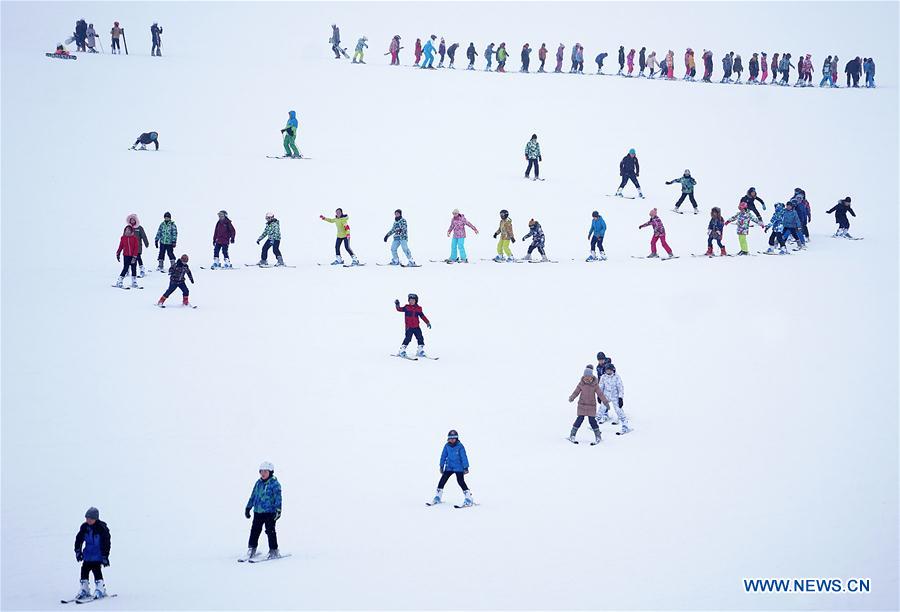Sino-Finnish seminar eyes sports culture
Chinese and Finnish experts gathered at a Beijing Olympic landmark on Tuesday to share expertise in the sustainable development of winter sports in the lead-up to the 2022 Winter Olympics.
Chinese and Finnish experts gathered at a Beijing Olympic landmark on Tuesday to share expertise in the sustainable development of winter sports in the lead-up to the 2022 Winter Olympics.

Pupils practise skiing in a ski resort in Altay, northwest China's Xinjiang Uygur Autonomous Region, Dec. 20, 2018. [Photo/Xinhua]
The lively scene of Beijing residents enjoying an outdoor ice and snow carnival at the National Stadium on Tuesday was a perfect complement for what was happening indoors. At the China-Finland Winter Sports Industry Seminar inside the 2008 Summer Olympics venue, officials and executives from the two countries' sports and business sectors gathered to exchange know-how and business opportunities in winter sports.
The seminar was among a series of events to launch the China-Finland Year of Winter Sports, an event the two countries' top leaders began planning in spring 2017.
As a new competitor and organizer of winter sports, China will make the best of the yearlong celebration to learn from Finland about specialized athletic training, venue management, event organization and services, said Gou Zhongwen, minister of the General Administration of Sport.
"The year of winter sports will provide a broad platform for us to draw experiences and knowledge from Finnish practices to develop our winter sports industry leading up to the 2022 Olympics and open up business opportunities for Finnish partners," Gou said in his opening remarks at the seminar.
Gou's counterpart, Sampo Terho, Finland's minister for European affairs, culture and sports, said his country has a lot to offer, particularly in sustainable ways for China to build a burgeoning industry around ice and snow activities beyond the Olympics.
As part of China's ambition to involve 300 million people in ice and snow activities by 2022, the country had built 738 ski resorts and 334 indoor skating rinks by June 2018, while winter sports facilities and tourism spots received 197 million visits during the 2017-18 season, a 16 percent annual increase, according to the administration of sport.
Still, the increasing numbers shouldn't cover up a lack of winter sports culture and talent in the sector, said Li Yingchuan, a deputy director of the administration.
"We still don't have enough accessible winter sports facilities as a country with a huge population and untapped market potential," he said. "We are also in great need of specialists in coaching, management and scientific research in winter sports."
Finnish expertise is ready to tap to help China address the gaps.
Jusa Susia, head of the East Asia region for Business Finland, a government-affiliated agency to promote Finnish business, said an association of all snow resorts in his country is working on a project to share with Chinese partners their best practices on year-round operation of ski resorts.
"We are ready to provide the full solution and training on how to operate a snow resort in both winter and summer so you can have a sustainable business mode," said Susia, who last month visited multiple resorts in Zhangjiakou, Beijing's co-host for 2022 the Games in Hebei province.
Diversifying services and entertainment choices to engage consumers of all ages is critical for the long-term business success of China's new venues, Susia added.
With more than 160 Olympic medals earned by their winter sports athletes, Finland is recognized as a powerhouse on ice and snow, where the locals say babies are born with skis on their feet.
Throughout the 2019 thematic year, which will close in the northern Finnish city Rovaniemi in December, more than 60 events are expected to help China develop its own winter sports culture.
They include the Chinese New Year Celebration in Helsinki, women's month in April, when Finland hosts the female ice hockey world championships, and the Winter Sports Expo in Beijing, where Finland will be the country of honor.
Another highlight is a long-term training program for Chinese national teams at Finland's Vuokatti Olympic Training Center, where Finnish coaches are working with 150 Chinese cross-country skiers, snowboarders and ski jumpers preparing for the 2022 Olympics.
"The level of Chinese athletes' individual skills is not on the elite level, but their potential is world-class. The goal is clear that we want to help them be the best," said Veikko Halonen, CEO of Vuokatti.

